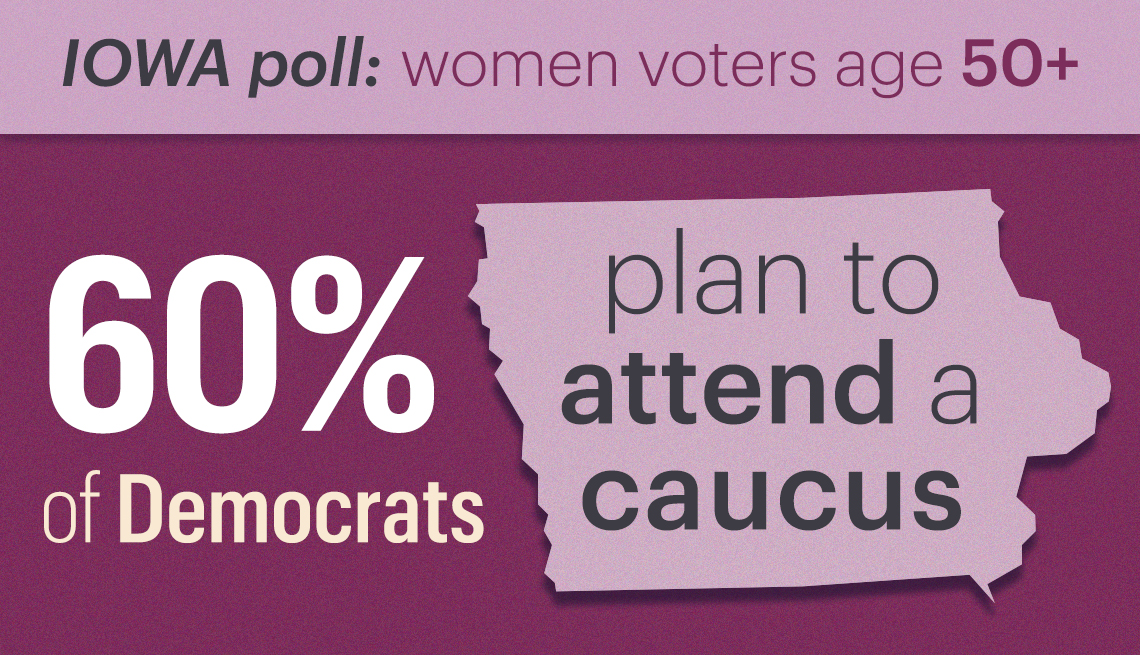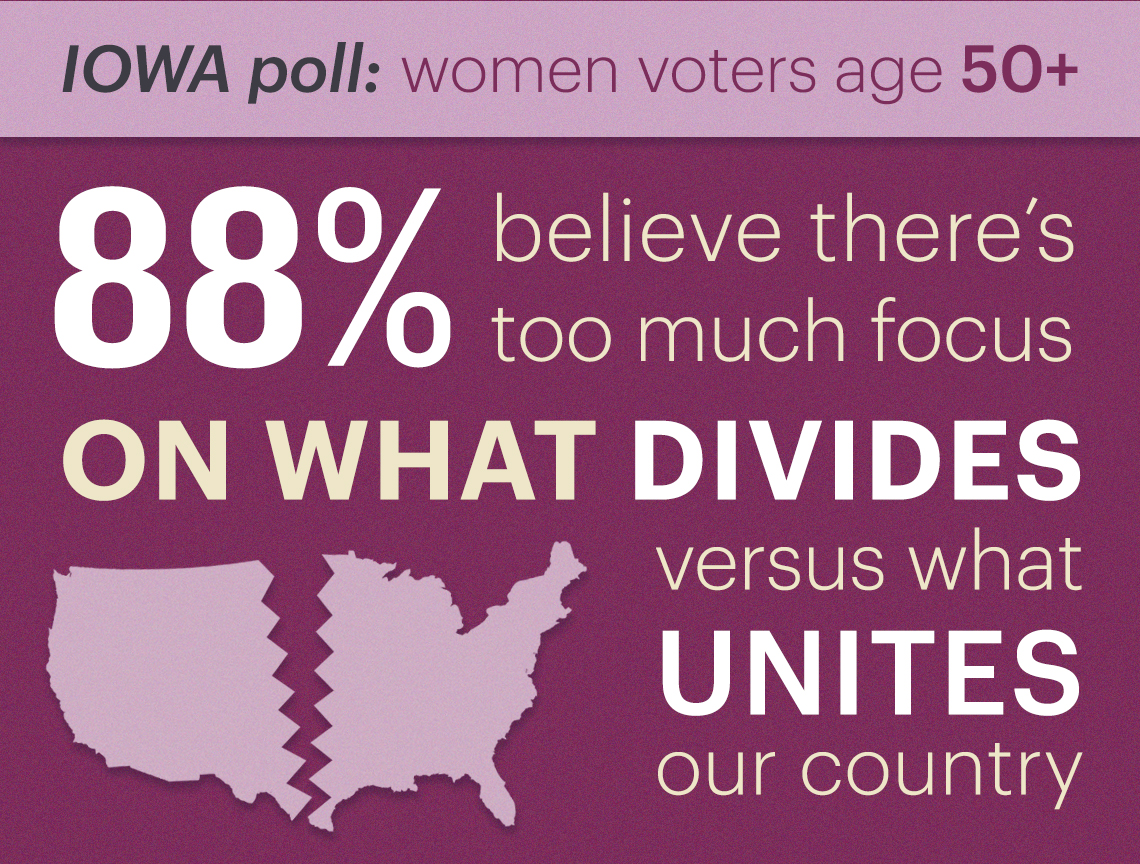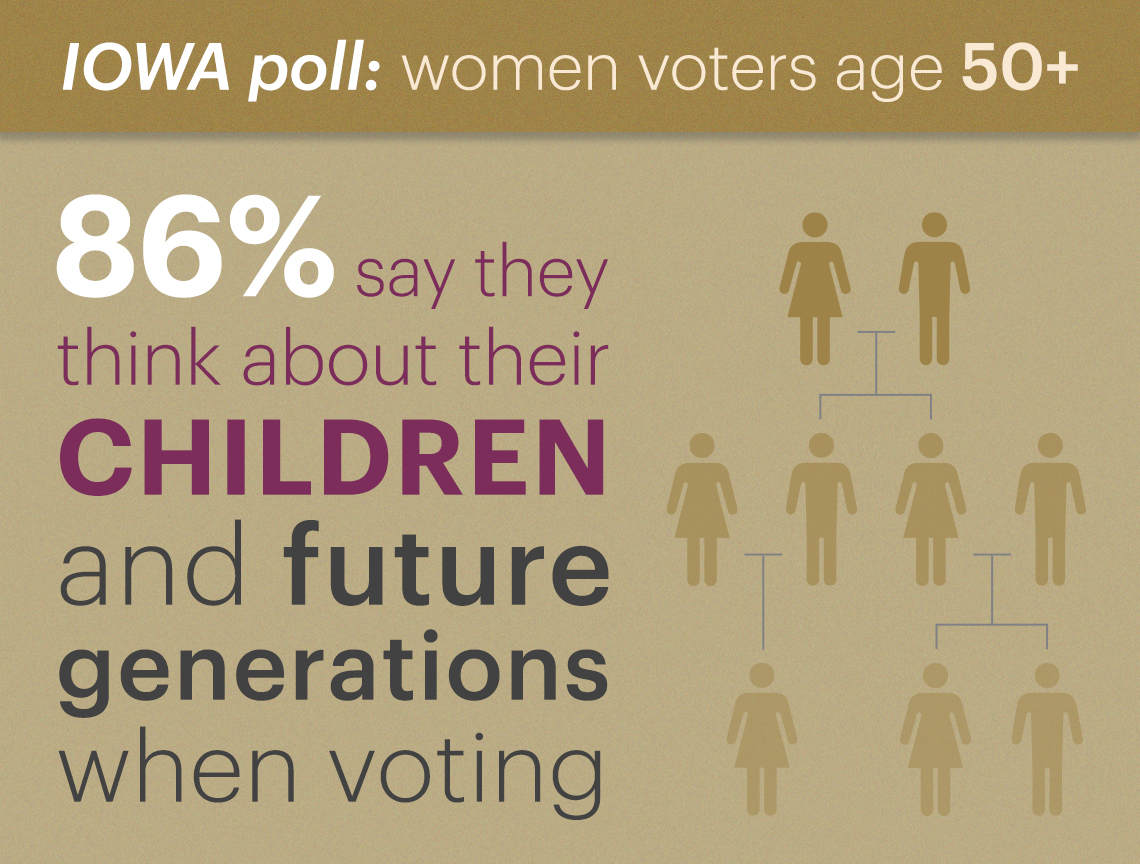AARP Hearing Center

En español | If candidates running for election in 2020 want the support of Iowa women age 50 and older, they had better have a solution to making the nation’s health care system more affordable, according to the results of a new AARP poll. The survey finds that the majority of women polled in the Hawkeye State plan to be at its first-in-the-nation caucuses Feb. 3, and the vast majority of likely attendees have already decided whom they will back.
“The Iowa poll shows that the issue of health care is the first, second and third most important issue on the minds of women caucus goers in Iowa over the age of 50,” says Brad Anderson, AARP’s Iowa state director. “This poll really confirms what we’re seeing on the ground in terms of candidates addressing the issue of health care. Any caucus goer turning on a television sees candidates blasting drug companies and hears about the importance of lowering prescription drugs and making health care more affordable.”
Health care was cited as a top issue by 48 percent of 50-plus women in Iowa, ahead of immigration (26 percent), terrorism (25 percent), and the environment and climate change (22 percent). The exclusive AARP survey was conducted by The Harris Poll. It’s the second in AARP’s “She’s the Difference” series, which will survey voters in a variety of states through the 2020 election season. Harris surveyed 1,001 Iowa female registered voters age 50 and over through a combination of telephone and online questioning from Dec. 5 to Dec. 25. (See the results of the first national “She’s the Difference” poll.)
“The Iowa poll is a call to action for leaders to home in on the issues that matter rather than the noise and the political divisiveness,” says Tawny Saez, a senior strategist at Harris.
Here is a look at some of the other key findings of this survey.
1. Iowa women plan to caucus

“I don’t think people fully appreciate the fact that so many of our precinct caucuses are dominated by people over the age of 50,” Anderson says, adding that women generally turn out at a much higher rate than men.
Among Democratic female voters age 50 and older, the 60 percent who say they plan to attend a caucus is dramatically higher than the 16 percent caucus turnout in 2016 among all voting-age Iowans. The poll also shows that among 50-plus women in Iowa, 35 percent of urban voters say they “definitely” will attend a caucus, compared with 23 percent who live in small towns or rural areas.

2. National leadership gets low marks

The familiar adage that all politics is local shows up in this poll, where the women surveyed are much more likely to have a favorable opinion of their local government leaders (69 percent) than their member of Congress (54 percent), as well as Democrats (40 percent) or Republicans (41 percent), in general, in the House of Representatives.
Nearly half (46 percent) said they do not feel that they have a voice in the political process, and among those who say they don’t plan to caucus on Feb. 3, the top reason they give is that they are “disgusted with the political system.”
“Women in Iowa really want to get down to business and what matters, rather than all of the noise,” Saez says. Yet, even though 88 percent of those polled believe too much attention is being paid to what divides us, 74 percent believe that Americans have more in common than they do differences.

3. Profits get priority over patients

“One of the things I was stunned at in the poll was the percentage of women who are forced to make decisions every month on whether they can afford to take their medications,” Anderson says. “That’s where this issue really hits home.”
Among those polled, 37 percent say they can’t afford to pay for their health care, 28 percent have skipped care because it was too expensive, and 29 percent have rationed prescription drugs because of high costs.
Pharmaceutical companies and health insurers get the blame for those high costs. A majority of those polled (53 percent) say drug companies charge too much for their products, and 45 percent say health insurance companies are prioritizing profits over patients’ health.

4. Health concerns also drive retirement planning

Though the “She’s the Difference” poll shows that Iowa women 50 and over think the economy is doing well in general (69 percent), a majority (63 percent) also say they are not confident they will have enough money to live comfortably throughout their retirement years because Social Security will not be enough to make ends meet. And 45 percent say they haven’t saved enough.
“Right now, women might say the economy is working well for them, but looking down the pike things aren’t so bright,” Saez says. “That’s why we’re starting to see this new definition of retirement turning into work.” Of those polled, 30 percent said they plan to work part time, start a business or do contract work as they get older. Of that 30 percent, more than half (56 percent) said they will do so because they need extra money.
Adding to a lack of confidence about retirement, Anderson says, is the ever-present concern over high health care costs. “To me what was striking about this issue of retirement was how directly tied health care costs are to the ability to retire,” Anderson says. “If you were to look around Iowa, nearly half of women over the age of 50 are not confident of retirement because of health care. To understand the gravity of that polling number is to really understand the crisis we have in terms of our health care costs.”

5. Iowa women worry about future generations

The kind of world they will leave their children and grandchildren will be on the minds of the vast majority of women over 50 who plan to caucus, the poll finds. And 30 percent think the most endangered value, right or institution is America’s standing in the world.
Anderson says the high ranking (fourth) for climate change among poll respondents’ top issues speaks directly to concerns about the kind of world these Iowans will leave for future generations. Their concern over this issue and the attention the past year’s floods in the Midwest and wildfires in Australia have engendered, Anderson says, “is probably one reason why candidates are addressing it and holding forums just dedicated to that one issue.”































































